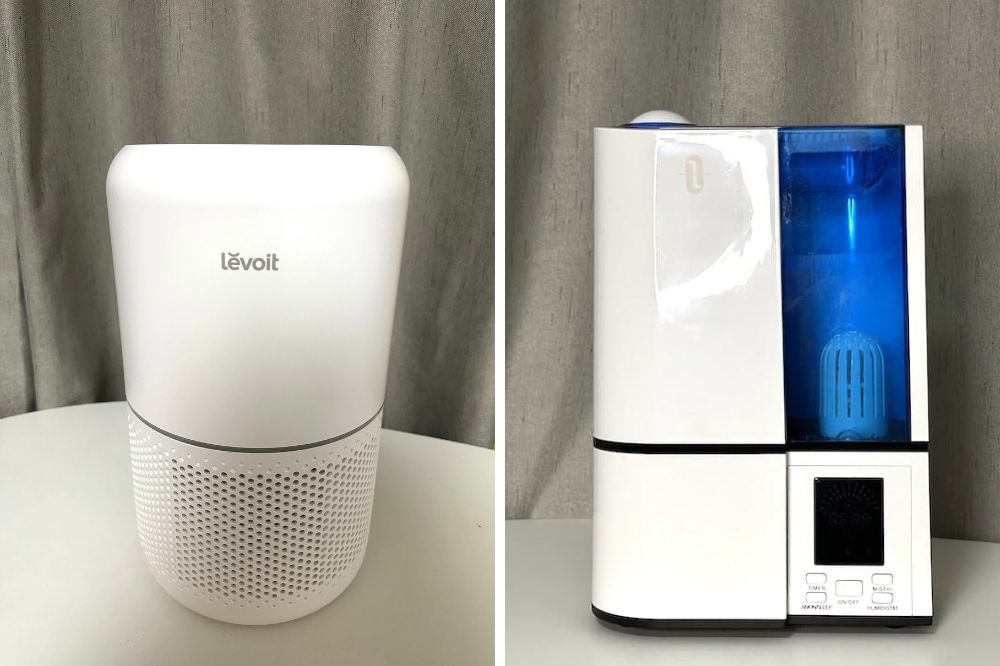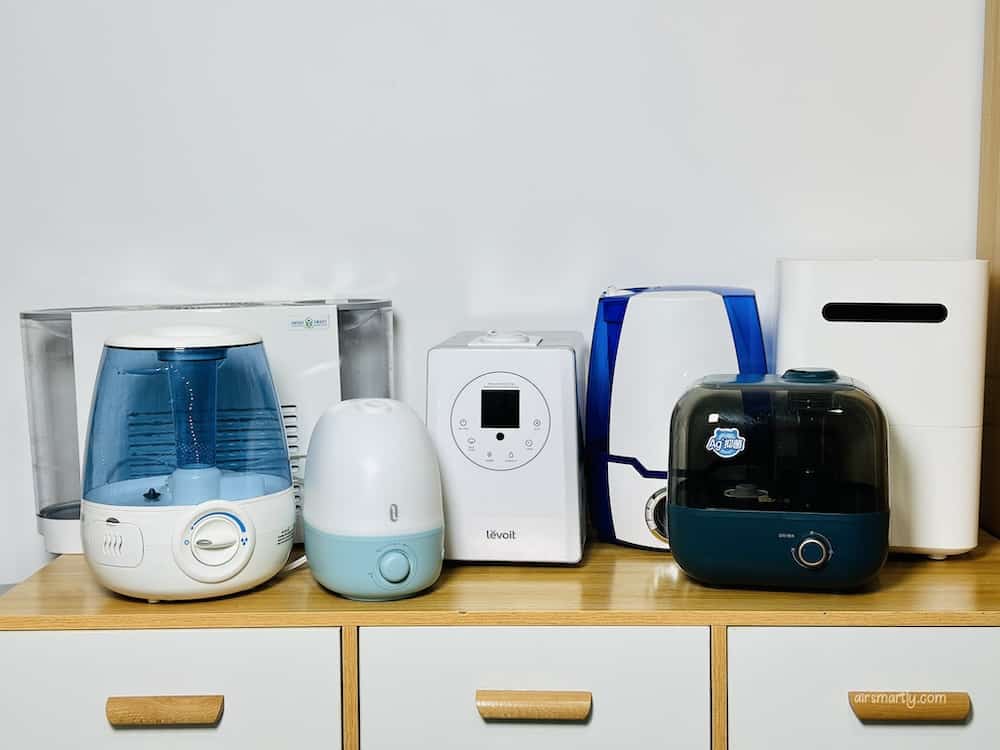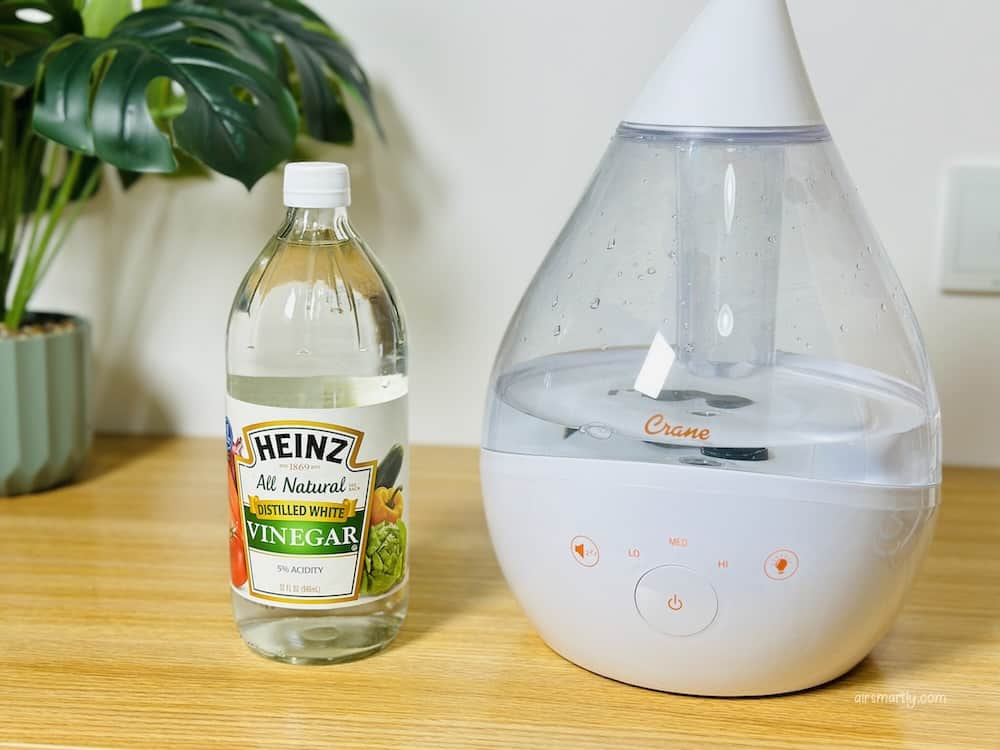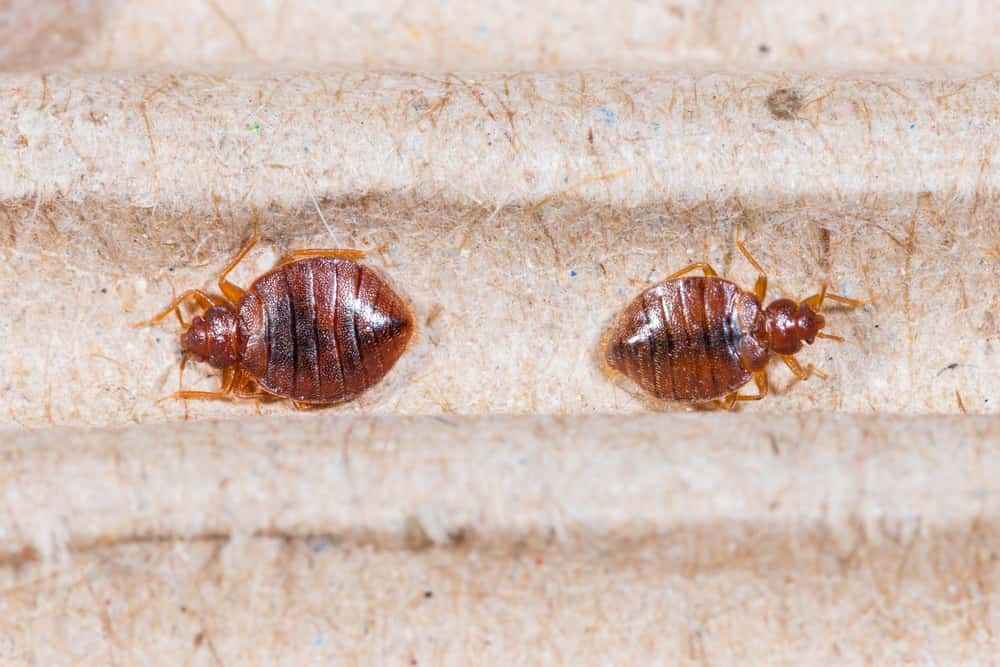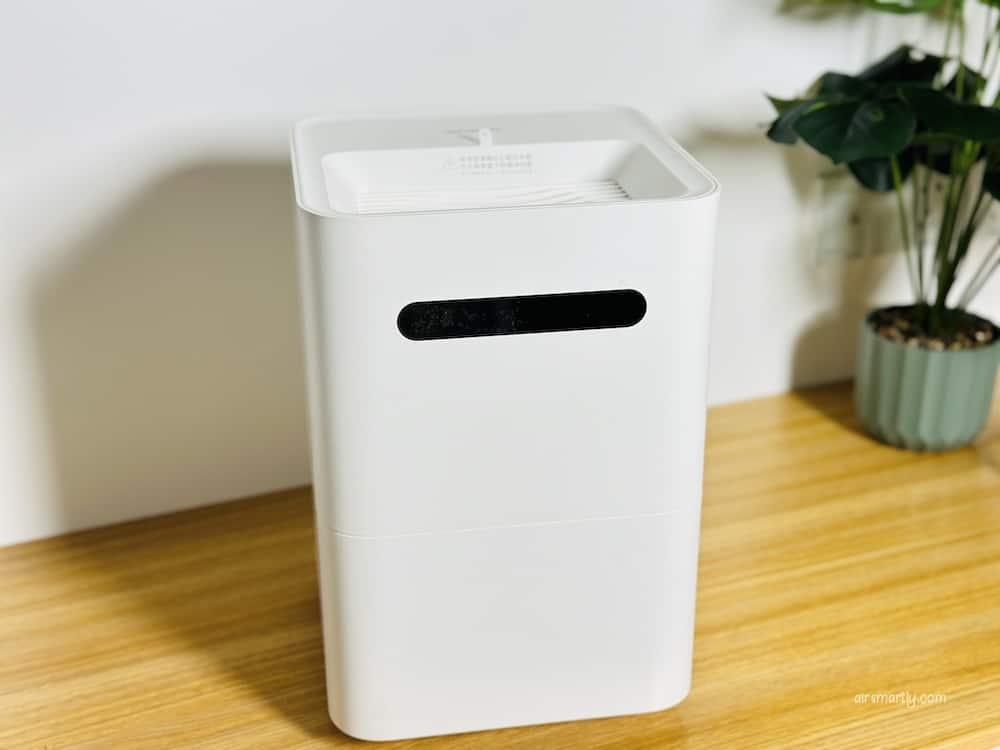Are you wondering whether you should go for an air purifier or a humidifier? It’s a common question that often leaves people scratching their heads, especially when trying to address specific health concerns.
Well, worry no more! In this post, we’ll break down the key differences between air purifiers and humidifiers and help you make an informed decision based on different situations.
So, let’s dive in!
| Your Needs | Air Purifier | Humidifier |
|---|---|---|
| Allergy and Asthma | ☆☆☆☆☆ | ☆☆☆ |
| Cold and Flu | ☆ | ☆☆☆☆☆ |
| Dry skin | / | ☆☆☆☆☆ |
| Baby | ☆☆☆☆ | ☆☆☆☆ |
| Structural integrity | ☆☆ | ☆☆☆☆☆ |
| Remove bad smell | ☆☆☆☆☆ | ☆☆ |
| Budget Friendly | ☆☆ | ☆☆☆☆ |
Air Purifier vs. Humidifier: What Is the Main Difference?
The main difference between humidifiers and air purifiers lies in their distinct purposes. An air purifier focuses on removing particles and contaminants from the air, whereas a humidifier is designed to increase your indoor humidity level.
So, an air purifier is used to solve problems caused by harmful particles in the air, whereas a humidifier is aimed at tackling issues caused by dry air.
An air purifier typically consists of several filters and a built-in fan. The fan draws the air into the machine, and after passing through these filters, the air becomes clean and is released back into the room.
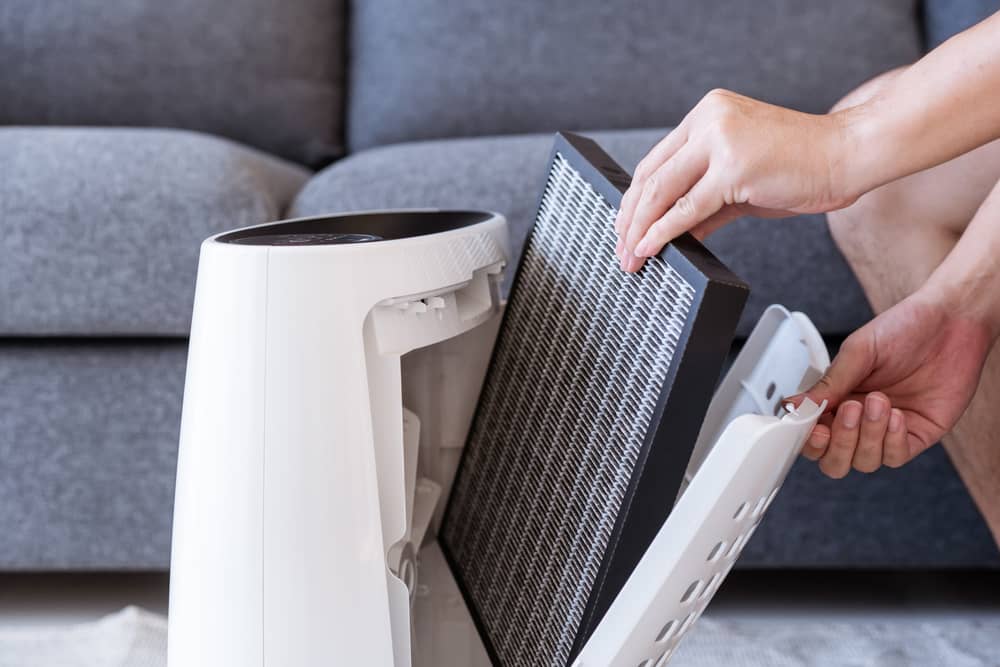
Thanks to the development of technologies, filters these days are able to remove odors, bacteria, dust, mold spores, and VOCs.
A humidifier requires working with water. By turning the water in the tank into water vapor and releasing it into the air, the indoor humidity level will go up. There are a few types of humidifiers. Some are filtered and some are filterless.
Evaporative humidifiers usually have a wick filter inside to absorb water from the water reservoir and remove contaminants present in the water. Additionally, it has a fan to facilitate the evaporation process.
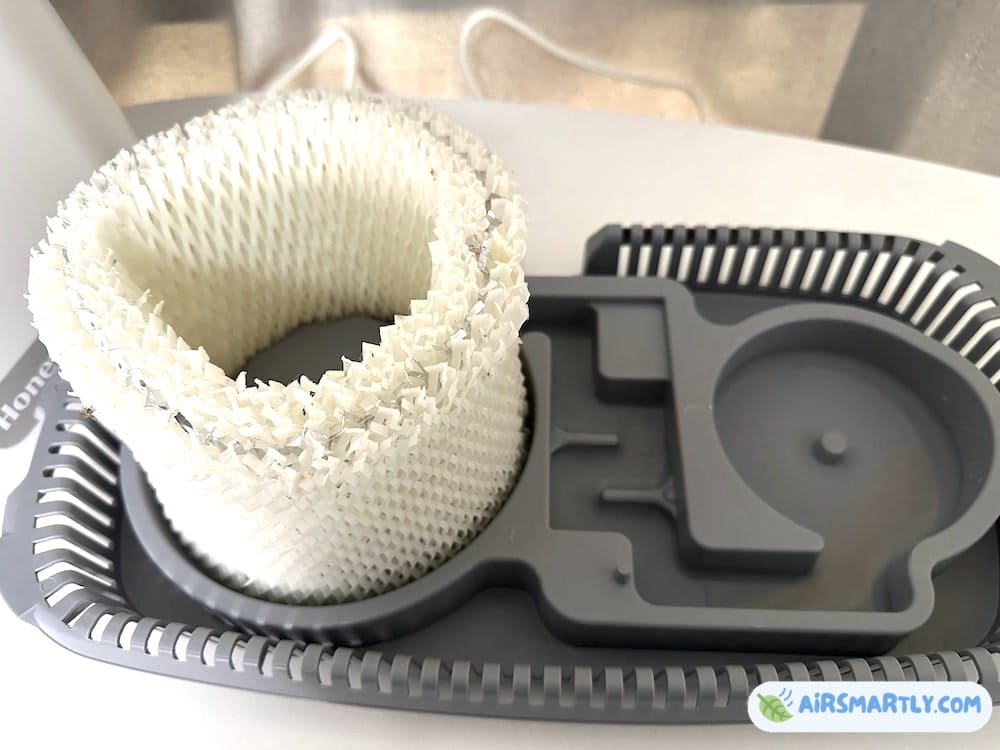
Most ultrasonic humidifiers are filterless. By breaking down the water into tiny particles through the vibration of a diagram, it can produce a mist for adding moisture.
Air Purifier vs. Humidifier: Choosing the Right Device for Various Health Conditions
Many people purchase these devices to alleviate their symptoms. Let’s explore whether you need an air purifier or a humidifier based on your specific health condition.
For allergy and asthma
According to Mayo Clinic, common airborne allergens include pollen, dust mites, mold spores, and pet dander.
If you’re dealing with allergies and asthma, an air purifier is a device you should consider getting. It can effectively filter out these allergens, helping to reduce your exposure to triggers.
However, that doesn’t mean a humidifier is entirely unhelpful for allergies and asthma. While dry air itself doesn’t cause allergic reactions, it can exacerbate existing respiratory conditions that are triggered by allergies.
In such cases, using a humidifier can provide relief by soothing dry sinus passages and making it easier to breathe when experiencing allergy symptoms.
However, you should make sure the humidity level will not exceed 55% because mold spores and dust mites will start to grow when the dry is too moist, which are common allergens you should avoid.
So air purifiers are a better choice for preventing allergies and asthma, but humidifiers are still helpful.
For colds and flu
According to Centres for Disease Control and Prevention (CDC), common colds and flu are caused by viruses.
It is proven that viruses will thrive when the humidity level falls below 33%. Since a humidifier can directly increase the moisture level in the air, it is an effective way to prohibit the growth of viruses.
In addition, symptoms of cold often include runny nose, coughing, and sore throat. The added moisture released by a humidifier can help soothe irritated tissues, and thin the mucus, making it easier to expel and promote a faster recovery.
As for air purifiers, not every model has the capability to remove or kill viruses because they are too small. Therefore, you should make sure the model you have has advanced filtration technologies or is equipped with UV-C light technology, which can help neutralize viruses.
As a result, a humidifier can prevent colds and flu as well as relieve related symptoms. An air purifier can be helpful only if it has the ability to capture or kill viruses.
For dry skin
The low moisture levels in the air can cause your skin to become dry and dehydrated. If you’re experiencing dry skin or chapped lips, using a humidifier is a great solution as it directly adds water particles to the air, increasing the humidity and moisture in your environment.
On the other hand, an air purifier is not likely to address this issue since its primary function is to remove airborne particles and pollutants from the air. It does not utilize water and therefore does not add any moisture to the space.
Air Purifier vs. Humidifier for Baby
Babies require extra care and attention because their bodies are still growing and maturing. When comparing air purifiers and humidifiers for babies, providing a single clear-cut answer can be challenging.
If your baby has dry skin or congestion, using a humidifier can help alleviate these symptoms. However, if your goal is to prevent allergic reactions or asthma symptoms in your baby, using an air purifier might have a more significant impact.
An air purifier can be used year-round to improve air quality and reduce allergens and irritants in the environment. On the other hand, a humidifier is typically used during dry seasons or in dry climates to add moisture to the air.
Air Purifier vs. Humidifier: Removing the Bad Smell
If your house has a bad smell, an air purifier is the solution you should consider. Since it contains multiple filters, it can effectively remove airborne particles such as dust, pet dander, and other chemical particles that cause odors. By eliminating these particles, the unpleasant smell will dissipate.
However, a humidifier can help with dust and other harmful airborne particles. This is because these particles can absorb the water vapor emitted by the humidifier and settle onto carpets or other surfaces. As a result, the bad smell will be alleviated to some extent but it is definitely not the main purpose of a humidifier.
Air Purifier vs. Humidifier: Ensuring the Safety and Integrity of Your House
Dry air can not only absorb moisture in your skin but also suck up moisture in the gaps in the wood.
If your house is made of wood structural components or has many pieces of wood furniture, the dry air can cause the wood to shrink, leading to air leakage, creaking, and squeaks.
Using a humidifier can maintain the indoor humidity at a proper level when the dry climate comes so that your house is always safe to live in.
An air purifier may not directly impact the structural integrity of a house as a humidifier does, but it can still be beneficial.
Mold and fungi present on surfaces can indeed cause damage to the house over time. An air purifier can help by filtering out airborne mold spores, minimizing the risk of further mold growth and damage. But it can’t remove the mold that has adhered to the surface.
Air Purifier vs. Humidifier: Considering Your Budget and Affordability
Air purifiers and humidifiers serve different purposes and are not interchangeable so you should always prioritize your needs first.
But sometimes, you may want both but have to decide based on your budget.
Usually, a humidifier would be cheaper than an air purifier. You can find a good humidifier under $100 pretty easily, but a good air purifier could cost you at least a few hundred dollars.
Can You Use a Humidifier and an Air Purifier at the Same Time?
Yes, using a humidifier and an air purifier together is not problematic. According to what we have discussed above, you can always reap more benefits by using them at the same time.
Humidifiers can play a crucial role in preventing the growth of viruses and alleviating various symptoms, while air purifiers excel at removing the most harmful airborne particles.
When these two devices work in harmony, the result is a delightful combination of comfortable and pristine air. By teaming up, they create an atmosphere that not only feels refreshing but also contributes to your overall well-being.
Nonetheless, it is worth mentioning that you should keep your humidifier clean. Failure to do so can turn it into a breeding ground for mold spores and bacteria, which can place an additional burden on your air purifier.
Additionally, if you place them too close to each other, the filter in the air purifier will become wet, affecting its efficiency.
Sum Up
Air purifiers and humidifiers have several fundamental differences. Air purifiers are for removing airborne particles and humidifiers are designed to increase water vapor in the air.
If you have more budget, you can use them together to get more benefits for your health and your asset.

